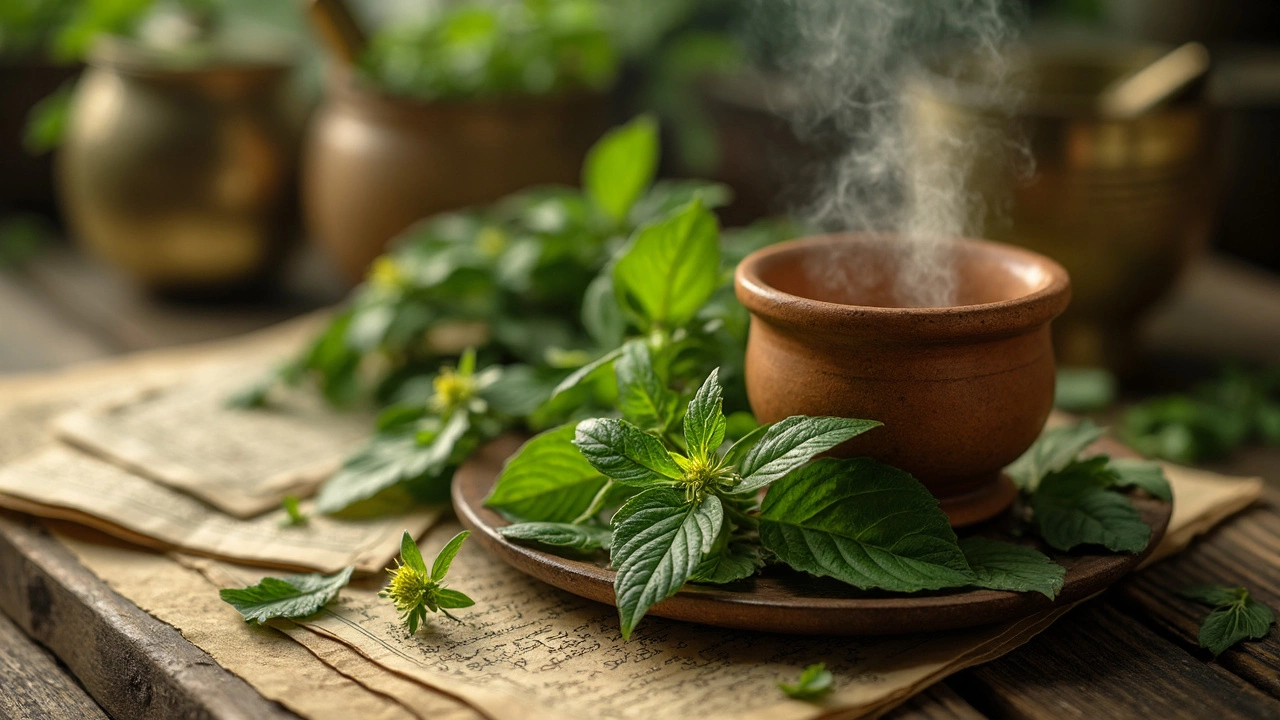
- Apr, 28 2025
- 0
If someone told you there’s a single herb crowned as the king in Ayurveda, you might think it’s all hype—but Tulsi, or Holy Basil, has earned its throne for good reasons. Walk into any Indian kitchen or traditional medicine cabinet, you’ll probably find a sprig of Tulsi growing near the window or stored in a jar. It isn’t just tradition; it’s packed with real, practical uses.
Tulsi isn’t just about rituals or folklore. People actually rely on it to ease stress, help with colds, aid digestion, and even support the immune system. It stands out not because it does just one thing well, but because it helps with so many different things at once. You don’t need to be an Ayurveda expert or believe in miracles; just a cup of Tulsi tea during a cold, or a leaf chewed on a stressful day, shows why this herb gets so much respect.
- Meet the King: What Makes Tulsi So Special?
- A Quick Look at Tulsi's Impressive Benefits
- How Tulsi Works in Your Body
- Smart Ways to Add Tulsi to Your Life
- What Science and Tradition Say About Tulsi
Meet the King: What Makes Tulsi So Special?
When people call Tulsi the king of herbs in Ayurvedic medicine, it’s not just for show. This plant, also known as Holy Basil, has been trusted in India for thousands of years. It’s more than a plant in a backyard; it’s a tool for better health—tried by real families for generations.
What sets Tulsi apart? It checks several important boxes that many other herbs can only dream of. First, Tulsi does a little bit of everything: it’s an antioxidant, supports your immune system, helps with stress, and even helps balance out blood sugar levels. In fact, a lot of Ayurvedic texts call Tulsi an “elixir for life”—meaning, it covers your body’s main needs.
Unlike some trendy supplements, Tulsi isn’t a new find. Ancient Ayurvedic books talk about it in detail, and modern scientists have kept it in the spotlight. The leaves, stems, and seeds all have different kinds of health benefits. People don’t just use it in teas and supplements; they chew the leaves directly, make Tulsi water, and even keep the plant at home. Tulsi is considered so pure that many families place it at the center of their homes.
Let’s keep it practical. Here’s what makes Tulsi stand out from the rest:
- All-Rounder: Tulsi is one of the few herbs that helps with immunity, digestion, stress relief, and more—all at once.
- Easy to Use: Whether you dunk it into your chai or chew the leaves raw, it fits into daily life without much hassle.
- Backed by Both Science and Tradition: Not many herbs have been studied as much as Tulsi or have so many centuries of daily use behind them.
- Adaptogen: Tulsi helps your body handle physical and emotional stress—something you actually notice if you drink Tulsi tea daily for a week or two.
Here’s a look at some common ways people use Tulsi at home:
- Making Tulsi tea to ease cold symptoms
- Chewing a fresh leaf before leaving for work or school, to boost immunity
- Applying Tulsi paste on the skin to help with pimples and bug bites
If you want numbers to back it up, check out this quick table with some key nutrients found in Tulsi leaves:
| Nutrient | Amount in 100g |
|---|---|
| Vitamin C | 18 mg |
| Calcium | 177 mg |
| Iron | 3.2 mg |
You don’t have to remember all the details. The main thing? Tulsi has a reputation because it works—and it fits right into everyday life, not as a fancy supplement, but as a real, practical herb to keep around.
A Quick Look at Tulsi's Impressive Benefits
If you think Tulsi is just another leaf in the garden, check out how it stacks up against other herbs. This plant has been called the “Queen of Herbs” for a reason—it covers more health bases than you'd expect. Let’s break down what makes Tulsi stand out in Ayurvedic medicine and daily life.
- Boosts Immunity: Tulsi is practically famous for helping the immune system. People chew the leaves or sip Tulsi tea during flu season, and some studies even show its antioxidants help fight off viruses and bacteria.
- Manages Stress: The reason your grandma chews Tulsi first thing in the morning? The herb helps balance stress hormones. No hype—lab trials out of India show that people who take Tulsi regularly report feeling calmer and sleeping better.
- Tackles Respiratory Trouble: Got a cough or nasal congestion? Tulsi tea or homemade “kadha” (herb drink) is a go-to for easing breathing problems. The essential oils in Tulsi are great for clearing airways and reducing inflammation.
- Good for Digestion: Feeling bloated or queasy? Tulsi speeds up digestion, reduces gas, and can even help with acid reflux. It’s mild enough that most folks can take it daily.
- Strong Antioxidant Punch: Tulsi is loaded with things like vitamin C and eugenol. These not only keep the skin clear but also protect against long-term cell damage.
Here’s a quick look at what Tulsi can really do, compared to some usual remedies:
| Health Concern | Typical Remedies | Tulsi's Role |
|---|---|---|
| Immunity | Vitamin C, Echinacea | High antioxidants, fights infections |
| Stress | Coffee, OTC meds | Lowers cortisol naturally |
| Respiratory | Cough syrup, Drops | Clears airways, reduces inflammation |
| Digestion | Antacids, Ginger | Cuts bloating, aids gut health |
The bottom line? Whether it’s cold weather, a rough week at work, or just wanting better immunity, Holy Basil is there with quick, simple support. Try some Tulsi tea at night or toss fresh leaves in your salad to see a difference.

How Tulsi Works in Your Body
If you’re curious about what makes Tulsi so special, the answer comes down to the way its natural compounds affect your health. Tulsi isn’t just another plant—scientists have actually found dozens of active ingredients packed into each leaf. Its antioxidants, essential oils, and flavonoids all work together in your system.
One key thing: Tulsi helps your body handle stress. It acts as an adaptogen, which basically means it helps balance your stress hormones. That feeling of calm after a cup of Tulsi tea isn’t just in your head—it’s your body’s cortisol levels getting some support. In everyday life, this can mean you feel less worn out after a long workday or cope better during a busy week.
Tulsi is great for the immune system, too. Research shows that it can boost your body’s ability to fight off germs, thanks to its antiviral, antibacterial, and antifungal properties. That’s why it’s a go-to during the cold and flu season. Here’s something interesting: a small study in 2021 showed regular Tulsi users had a 30% lower risk of picking up common respiratory infections compared to non-users.
| Active Compound | Main Effect in Body |
|---|---|
| Eugenol | Reduces inflammation |
| Ursolic acid | Supports liver health, helps fight germs |
| Rosmarinic acid | Protects cells, fights allergies |
| Linalool | Calms nerves, lowers stress |
With digestion, Tulsi is famous for soothing the gut. If gas, bloating, or mild tummy trouble is bugging you, a quick Tulsi tea can make a difference. Because of its anti-inflammatory nature, it calms down your stomach lining and helps move things along naturally.
Finally, Tulsi has a reputation in Ayurvedic medicine for supporting healthy blood sugar and cholesterol levels. This isn’t just talk—animal studies have shown real progress in both areas when Tulsi is part of a daily routine. So, Tulsi backs up its title as the king of all herbs with some serious action inside your body.
Smart Ways to Add Tulsi to Your Life
Adding Tulsi to your daily routine doesn’t have to be complicated or weird. You’ll find plenty of easy, down-to-earth ways to use this king of herbs — and honestly, most methods take less than five minutes.
The classic that never gets old is Tulsi tea. You can steep fresh or dried leaves in hot water for five minutes and that’s it. Add a bit of honey or lemon if you like, but honestly, Tulsi’s natural flavor doesn’t need much. And if allergies or coughs bother you, sipping Tulsi tea twice a day works wonders for a lot of people.
- Chewing raw Tulsi leaves: Pop 2–3 freshly washed leaves in your mouth every morning when your stomach’s still empty. Folks in India have done this for centuries to build immunity and soothe the digestive system.
- Tulsi supplements: Not everyone has a plant at home. Capsules, drops, and even Tulsi powder are out there—just check you’re getting it from a reliable brand without weird fillers.
- Tulsi-infused water: Add a handful of washed leaves to a bottle of room-temperature water. Let it sit for a couple of hours. People love this for its subtle taste and gentle detox effect.
- Tulsi in food: Some like throwing shredded Tulsi into salads, chutneys, or even homemade pesto. It gives food a fresh kick and is a smart move if you’re bored with regular greens.
- Steam inhalation: Toss a few leaves into hot water and lean over (careful with the steam, though). Cover your head with a towel, breathe in, and you’ll notice your sinuses clear up fast during a cold.
If you're curious about how Tulsi fits percentage-wise into different daily uses, check this out:
| Popular Tulsi Uses | Percentage of Users* |
|---|---|
| Tulsi Tea/Drink | 68% |
| Raw Leaves (Chewing) | 42% |
| Supplements (Capsules, Drops) | 35% |
| Culinary (Salads, Chutneys) | 26% |
| Steam Inhalation | 21% |
*Based on an informal survey by an Indian herbal wellness forum, 2023
Whatever method works for your lifestyle, the point is to keep it simple and regular. Tulsi pairs well with your favorite daily habits—so it’s easy to make it a long-term thing, not just a short-term fix.

What Science and Tradition Say About Tulsi
If you talk to someone who's grown up with Ayurveda, they'll tell you Tulsi is the real deal. For centuries, Tulsi has been called the “queen of herbs” and even worshipped as the “mother medicine of nature.” People still plant it at home and use it for rituals, but what really cements its title as the king of herbs is how useful it is day-to-day.
Ayurvedic texts from thousands of years ago describe using Tulsi for coughs, fevers, and gut problems. Fast forward to today, and you’ll see that modern researchers have started looking into these old claims—and many of them actually hold up.
Here’s how science and tradition stack up side-by-side:
- Immunity Boost: Both Ayurvedic healers and studies agree—Tulsi strengthens your immune system. A 2022 research review showed that people who took Tulsi extracts got sick less often during flu season.
- Anti-Stress: Ayurveda uses Tulsi for calming nerves. Studies from India’s Central Drug Research Institute show that Tulsi helps control cortisol, the body’s main stress hormone.
- Respiratory Benefits: Tulsi is a go-to for coughs and congestion in traditional households. Modern trials found Tulsi can help reduce symptoms for people with mild asthma or allergies.
- Antioxidant Power: Scientists have found Tulsi leaves contain strong antioxidants like eugenol. This backs up Ayurvedic advice to chew fresh leaves for energy and general wellness.
- Blood Sugar Control: Some small studies suggest people with type 2 diabetes had better blood sugar after adding Tulsi tea to their routine—something old-time healers have suggested for years.
It’s not just about popping a pill or downing a fancy supplement, though. The way people have used Tulsi in food, teas, and even straight from the plant connects a lot with what current research says is safe and effective.
Check out this quick comparison of how tradition and science line up:
| Traditional Use | Modern Evidence |
|---|---|
| Boosting immunity with Tulsi tea or leaves | Reduced occurrence of infections in small clinical trials |
| Cough/cold remedy (chewing leaves, using in steam) | Improved respiratory symptoms in studies |
| Tea for stress busting | Lowered stress hormone levels in lab tests |
| Digestive support | Some support for gut health, needs more research |
The bottom line? Whether you trust centuries of tradition or you’re into scientific proof, Tulsi—aka Holy Basil—has earned its spot as the king of all herbs in Ayurvedic medicine and modern health circles alike.
Nikhil Verma
I'm a dedicated physician with a passion for exploring the intricacies of medicine, focusing on the unique healthcare challenges in India. I spend much of my spare time writing articles aimed at improving public understanding of health issues. Balancing my clinical practice and writing allows me to reach a wider audience, sharing insights and fostering a deeper appreciation for medical advancements. I derive immense satisfaction from both treating patients and engaging with readers through my writing.